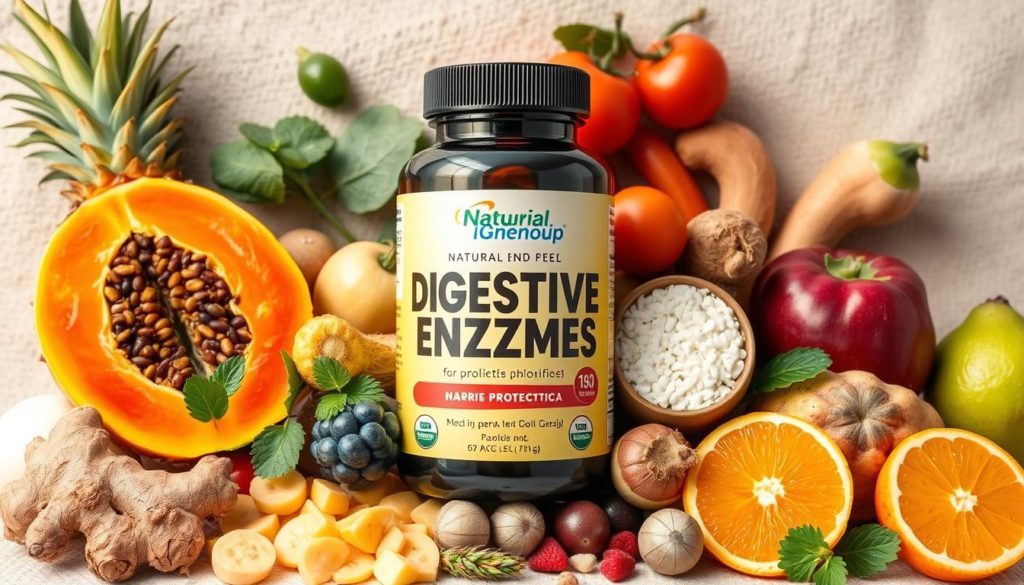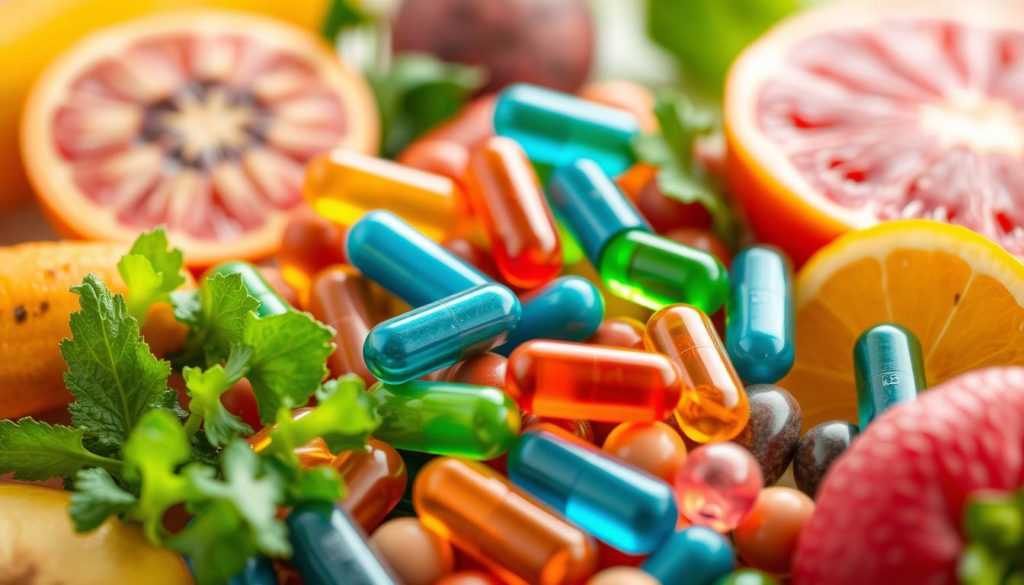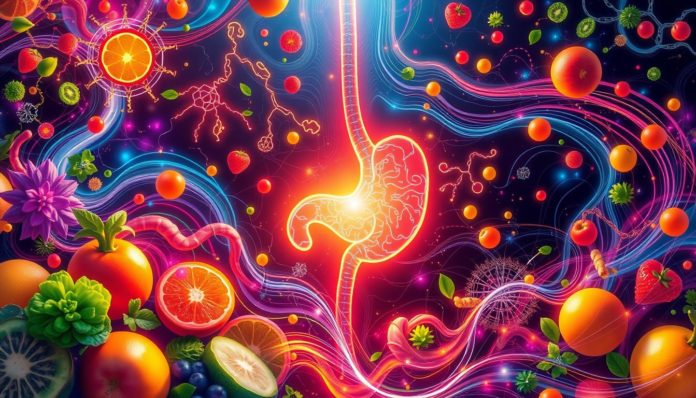Did you know up to 70 million Americans face digestive issues? This fact shows we need better solutions for Digestive Health. Digestive enzymes could be that solution. They are key to Optimal Digestive Function. Understanding enzyme therapy can improve your gut health and well-being.
Let’s dive into the science of digestive enzymes and their benefits. We’ll also show how to easily add them to your daily life. Get ready for a journey to a healthier gut and a happier you!
What Are Digestive Enzymes?
Digestive enzymes are vital for breaking down food into nutrients. They help our bodies get the most out of what we eat. This ensures we absorb all the goodness from our meals.
Definition of Digestive Enzymes
Digestive enzymes are special proteins that help digest food. They break down complex molecules like carbs, proteins, and fats. This makes it easier for our bodies to absorb these nutrients. You can find these enzymes throughout the digestive system.
The Role of Digestive Enzymes in the Body
Digestive enzymes speed up food breakdown. Without them, it’s tough for our bodies to get the nutrients they need. We might even face nutritional shortages and digestive problems. Amylase, protease, and lipase are some of the key enzymes.

Natural digestive enzymes also keep our digestive system healthy. If we don’t have enough, we might feel bloated, gassy, or have indigestion. It’s important to have a balance of these enzymes for our health.
Benefits of Using Digestive Enzymes
Digestive enzymes are key for great digestive health. Adding enzyme supplements to your day can bring lots of benefits. These benefits help you feel better overall.

Improved Nutrient Absorption
Taking digestive enzymes boosts nutrient absorption. With a more efficient digestive system, your body gets more vitamins and minerals. This means you get more from your food, helping you stay healthy.
Enhanced Gut Health
Enzyme supplements also improve gut health. They make it easier for your body to break down food. A healthier gut means a stronger immune system and better overall health. With regular use, your digestive system becomes stronger and more balanced.
Reduction of Digestive Discomfort
Many people deal with bloating, gas, and other digestive problems. Digestive enzymes reduce these problems by aiding digestion. They break down food more efficiently, easing the load on your digestive system. This means less discomfort for you.
Different Types of Digestive Enzymes
Digestive enzymes are key for turning food into nutrients our bodies can use. We’ll talk about three main enzymes: amylase, protease, and lipase. Knowing about these can guide us in choosing the right enzyme supplements.
Amylase
Amylase breaks down carbs into simple sugars. It starts working in the mouth and keeps going in the pancreas. If you have trouble with carbs, supplements with amylase might help.
Protease
Protease enzymes turn proteins into amino acids. They work in the stomach and pancreas, helping us digest meat, dairy, and nuts. For those eating a lot of protein or having digestion troubles, protease supplements could be beneficial.
Lipase
Lipase is all about fats. It turns fats into fatty acids and glycerol, mostly in the pancreas. People with issues digesting fats, like those with pancreatic problems, might find lipase supplements helpful.
| Enzyme Type | Main Function | Sources |
|---|---|---|
| Amylase | Breaks down carbohydrates | Saliva, pancreas |
| Protease | Breaks down proteins | Stomach, pancreas |
| Lipase | Breaks down fats | Pancreas |
How to Choose the Right Enzyme Supplements
Finding the right enzyme supplements can be tricky with so many choices out there. To pick wisely, it’s key to know your digestive needs well. You should also carefully check the supplement labels. This helps in getting the most from enzyme therapy and digestion aid.
Understanding Your Digestive Needs
First, figure out what your digestive system really needs. Your diet, lifestyle, and specific digestive issues matter a lot. For example, if you’re missing some enzymes, you might not handle lactose or fats well. Using the right enzyme supplement can not only help with digestion. It can also boost your overall health.
Reading Supplement Labels
Understanding supplement labels is crucial for finding what suits your digestion. Look for how strong the enzymes are, shown in units like USP or FCC. It’s important that the ingredients are top-notch and the enzymes match your needs. No matter if you need help with proteins, fats, or carbs, the right supplement can make a big difference in enzyme therapy.
- Potency – It’s vital that the supplement has enough enzyme activity to help with digestion. Always check the label for activity units.
- Ingredients Quality – Choose brands that use high-quality, natural ingredients to steer clear of negative side effects.
- Blend of Enzymes – Your supplement should include a variety of enzymes, like amylase, protease, and lipase, to match your diet needs.
Incorporating Digestive Enzymes into Your Diet
Adding natural digestive enzymes to your diet is easy and can boost your digestion. These enzymes help your body break down food and absorb nutrients better.
Natural Food Sources
Some foods are rich in natural digestive enzymes. These can improve your digestive health. Here are a few good sources:
- Pineapples: They have bromelain, an enzyme that aids in digesting proteins.
- Papayas: Contains papain, which helps break down proteins.
- Fermented Foods: Foods like kimchi, sauerkraut, and yogurt have lots of digestive enzymes.
- Mangoes: They provide amylases, good for breaking down carbohydrates.
- Bananas: Offer both amylases and glucosidases, helping with carbohydrate digestion.
Supplementation Tips
For those who can’t get enough enzymes from food, supplements are a good option. Here are ways to include enzyme supplements in your diet:
- Consult a healthcare professional: Always talk to a doctor before trying new supplements.
- Check the labels: Choose high-quality supplements that specify the enzymes they provide, like amylase, protease, and lipase. This helps meet your digestive needs better.
- Start with a lower dose: Begin with a small dose to see how you react, then adjust as needed.
- Take with meals: For best results, take digestive enzyme supplements right before or with your meal.
Using these tips for natural enzymes and supplements can boost your digestive health and well-being significantly.
Digestive Enzymes vs. Probiotics: What’s the Difference?
Knowing how digestive enzymes and probiotics differ is vital for gut health improvement. They each play critical, but different, roles. This knowledge can guide you in caring for your gut.
Digestive Enzymes are molecules that help break down food like proteins, fats, and carbs. Our bodies make these enzymes, mainly in the pancreas. You can take supplements if your body needs more. Amylase, protease, and lipase are common kinds. When low on these enzymes, digestive problems can happen. So, keeping enzyme levels balanced is important.
Probiotics are living microorganisms that boost health by helping the gut’s bacterial balance. They don’t directly digest food. Instead, they improve the gut environment. Probiotics make vitamins, fight bad bacteria, and strengthen the immune system. You can find them in yogurt and fermented products.
Here’s a quick way to understand their differences:
| Criteria | Digestive Enzymes | Probiotics |
|---|---|---|
| Function | Break down food into nutrients. | Maintain gut bacterial balance. |
| Main Sources | Pancreas, enzyme supplements | Yogurt, fermented foods |
| Benefits | Improved nutrient absorption, reduced digestive discomfort | Enhanced immune function, improved gut health |
Thinking about digestive enzymes or probiotics for your gut health? It’s smart to pick what suits your specific needs. The correct choice can greatly enhance your gut health and digestion.
How Pancreatic Enzymes Aid Digestion
Pancreatic enzymes are key to breaking down carbs, fats, and proteins. They help our bodies soak up nutrients better, which boosts digestive health. If the pancreas makes too few enzymes, taking supplements can help a lot.
The Function of Pancreatic Enzymes
These enzymes are released into the small intestine. Here, they start breaking down big food molecules. The main enzymes are:
- Amylase: Breaks down carbohydrates.
- Lipase: Breaks down fats.
- Protease: Breaks down proteins.
If we didn’t have these enzymes, getting nutrients would be tough. This is especially true for people with certain health issues. Conditions like cystic fibrosis or pancreatic cancer lower enzyme production.
Supplementation of Pancreatic Enzymes
For those with low enzyme levels, supplements can be a big help. They act like the pancreas’ own enzymes, assisting in breaking down food. This means better digestion and more nutrient uptake.
| Condition | Beneficial Pancreatic Enzyme | Impact |
|---|---|---|
| Chronic Pancreatitis | All pancreatic enzymes | Improved digestion and reduced discomfort |
| Cystic Fibrosis | Amylase, Lipase, Protease | Enhanced nutrient absorption |
| Post-pancreatectomy | All pancreatic enzymes | Compensates for enzyme loss |
To pick the best enzyme supplement, it’s key to think about one’s specific needs. Always talk to a doctor to get the best advice. The right supplements can lessen symptoms and better someone’s life if they have enzyme issues.
Potential Side Effects and Safety of Enzyme Therapy
Enzyme therapy helps with digestion but has potential side effects. Allergic reactions are common if you’re sensitive to certain ingredients. Symptoms like rash, itching, and swelling may show you’re allergic. It’s important not to ignore these signs.
Sometimes, enzyme therapy can cause stomach issues. This includes bloating, gas, and diarrhea. These problems can happen if you take too much or the wrong enzyme. Always follow the recommended dose. Start small and slowly increase. This lets your body get used to the enzyme.
Always talk to a healthcare provider before starting enzyme supplements. This is vital if you have health issues or take other meds. A healthcare professional will make sure the enzyme supplement is safe for you. The aim is to safely improve your digestion. That means getting the dosing right to avoid any problems.
FAQ
What are digestive enzymes?
Digestive enzymes are natural proteins your body makes to break down food. They turn food into nutrients, so it’s easier for your body to take them in. They’re key for healthy digestion.
How do digestive enzymes support digestion?
They help in breaking down carbs, proteins, and fats. This lets your body absorb and use these for energy, growth, and fixing cells. For those with digestive problems, enzymes can really help.
What are the benefits of using enzyme supplements?
Enzyme supplements boost how well you absorb nutrients and improve gut health. They also ease digestion issues. This is very helpful if you often feel bloated or have irregular bathroom visits.
What types of digestive enzymes are there?
There are key enzymes like amylase for carbs, protease for proteins, and lipase for fats. These enzymes are crucial for digesting food properly.
How do I choose the right enzyme supplements?
First, figure out your digestion needs. Then, read labels and pick supplements with quality ingredients. Making sure they match your diet is key.
Are there natural food sources of digestive enzymes?
Yes, foods like pineapples, papayas, yogurt, and kimchi have lots of enzymes. Eating these can boost your digestion naturally.
What’s the difference between digestive enzymes and probiotics?
Digestive enzymes break down food into nutrients, while probiotics are good bacteria that keep your gut healthy. They both help digestion but in different ways.
How do pancreatic enzymes aid digestion?
Pancreatic enzymes help digest proteins, fats, and carbs. If your pancreas isn’t working right, you might need extra enzymes to help with digestion.
Are there any side effects of enzyme therapy?
Some people might get stomach pain, cramping, or allergic reactions from enzyme therapy. Always talk to a doctor before starting supplements, especially if you have health issues.


